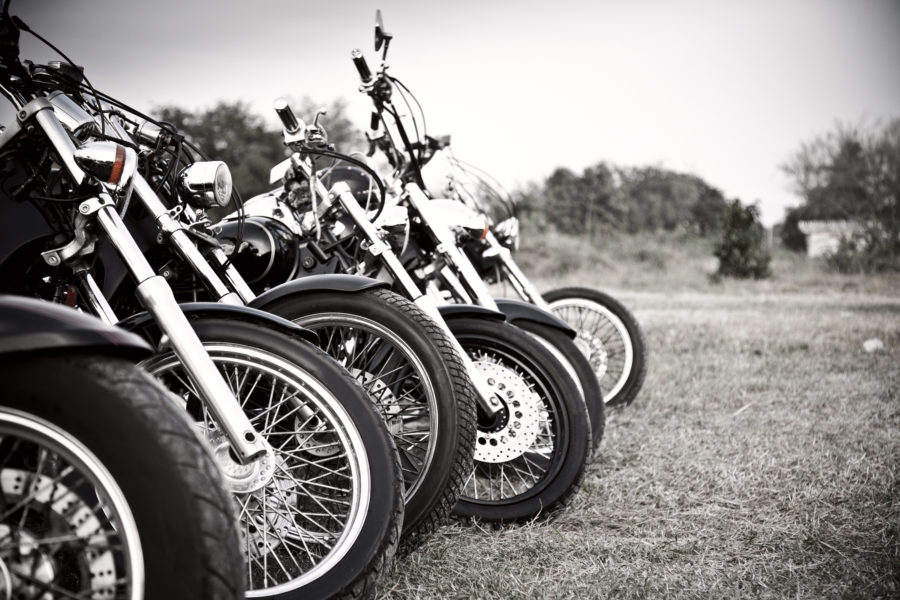
Hell Boy swings a mean stick.
Just ask Jeffrey Shank.
The two outlaw motorcycle gang members “got together” one afternoon back in April 2018 at a gas station on Elizabeth Avenue in Newark. Shank, who had just left the Hells Angels’ clubhouse a few blocks away, stopped to get some gas for his bike.
Hell Boy, whose given name is Robert DeRonde, pulled into the station in a pickup truck. A video surveillance camera captured the action from there. DeRonde jumped out of his truck with a metal baseball bat in his hands and leveled his first shot, a two-handed swing from the right side, at Shank’s head. The biker, fortunately, was wearing a helmet. He went down, but then tried to scramble to his feet.
Hell Boy moved in, swinging from the left side this time, and cracked Shank across the back and shoulders several times. The camera then picked up two other men closing in, one wielding what appeared to be a long metal pipe that he used to bash Shank across the ribs and back.
The three hitmen then left the scene with Shank crumpled in a ball next to his bike. DeRonde, who later pleaded guilty to an assault charge and was sentenced to four years in prison, was a member of the Pagans Motorcycle Club, according to authorities. Shank was an associate of the Hells Angels. The gas station attack was a vivid example of what law enforcement investigators contend is an escalation in tension between the two rival biker gangs who are vying for control and dominance in one of the darkest and most brutal segments of the underworld.
The New Jersey State Commission of Investigation (SCI) aired the video at a hearing in Trenton back in October that focused on what investigators say is growing concern over the violent resurgence and expansion of the Pagans.
The three-hour hearing included testimony from investigators who have tracked the activities of the club. They said there has been a rise in both membership and assaults over the past two years.
The hearing also included recorded testimony about life in the biker underworld from three former club members whose voices were disguised to protect their anonymity. And finally, there were appearances by three alleged leaders of the New Jersey branch of the organization, all of whom repeatedly cited their fifth amendment right against self-incrimination while refusing to answer nearly every question posed to them.
Like the mob, the bikers believe in a code of silence.
And like the mob, bikers have always used violence as both a negotiating tool and a way to settle disputes. The beating at the gas station was a little of both. Authorities say the Pagans are trying to move into Hells Angels territory in both North Jersey and New York.
One investigator who testified at the hearing said it was “just a matter of time” before a war breaks out between the two groups and expressed concern that “civilians get caught in the middle.”
The Pagans and the Hells Angels have been there before.
The Hellraisers Ball on Long Island back in 2002 is one graphic example. A group of about 60 Pagans stormed a catering hall where the Hells Angels-sponsored event was being held. The affair was open to the public and included blues bands, porn stars, motorcycle exhibits and tattoo contests. One Pagan was killed and dozens of others were injured in the melee that ended with multiple arrests. Police seized nearly 500 weapons that day, including guns, knives, bats and clubs. Civilians—non-bikers attending the event—were simply collateral damage, caught in the line of fire.
On a smaller scale, Pagans often boast about what is known in the biker underworld as “The Bloodshed at the Woodshed.” The Woodshed was a bar in Burlington County where on New Year’s Day in 2005 a group of Pagans and their associates attacked and brutally beat three Hells Angels who at the time were recruiting members in South Jersey and Philadelphia. Several Pagans, in fact, had “patched over,” giving up their membership in the Pagans to become Hells Angels.
A few weeks after the Woodshed attack, one of those Pagans-turned-Angels was killed in a drive-by shooting on the Schuylkill Expressway in Philadelphia after being followed by members of the Pagans from a local go-go bar.
The Pagans may not boast the membership numbers of some of the bigger clubs—the Hells Angels, the Outlaws and the Bandidos—but they have always matched or exceeded them when it comes to violence. No one has ever been arrested in connection with that murder or with the attack at the Woodshed.
It is the conventional wisdom in law enforcement circles that the Pagans thwarted the Hells Angels’ attempted move into the Philadelphia–South Jersey area back in 2005. Now, the SCI seems to be saying, the Pagans have embarked on an expansion plan of their own.
One clear example, authorities said, is a change on the “colors” that club members wear. The blue denim vests or jackets with word Pagans in large letters across the back often included the location of the local chapter along the bottom. Now, authorities say, that is being replaced with the words “East Coast,” a signal that the club wants a regional rather than a local identity.
Whatever the locale, however, the club is still heavily involved in extortion, drug dealing and violence, say investigators. Meth is still the drug of choice for both sale and consumption within Pagan circles, say police. But now instead of manufacturing their own—for years Pagan Purple was a recognized brand in the meth business—most of the meth being sold by the bikers is imported from Mexico in a distribution deal with drug cartels from south of the border.
Little else has changed within the organization, with drugs and extortion being primary sources of income; violence and intimidation being a way of life, and misogyny a big part of the club’s social set.
“Women are lower than dogs,” one expert testifying before the SCI said during the hearing in October. Women can never be members. Like the mob, the biker underworld is one of the last exclusive men’s clubs in America. Women are designated as “property of” different club members and can be shared sexually. They are also used to transport drugs and weapons and as messengers bringing information to and from different chapters.
The SCI hearings opened a window into the operations of the outlaw gang. The testimony and evidence reinforced much that has already been said and written.
A former Pagan, James “Jimmy D” DeGregorio, offered similar insights after he became a cooperating witness back in the 1980s. DeGregorio, interviewed for a documentary now available on YouTube, described himself as a former “cooker”—meth manufacturer—for the club. He said he turned to the government after members of his own organization tried to set him up for murder.
This was at a time when the Pagans boldly clashed with the Philadelphia mob then headed by Nicodemo “Little Nicky” Scarfo. Scarfo tried to impose a “street tax” on all drug dealers not affiliate with his crime family. Many paid. But the Pagans balked.
In fact, DeGregorio and an associate kidnapped two mobsters during the ongoing dispute and DeGregorio shot one of the mobsters as he tried to flee. DeGregorio was arrested—the shooting occurred in downtown Philadelphia and within view of several police officers. Jimmy D said he was ready to do his time for that assault. It came with his life as an outlaw biker.
What he wasn’t ready for, he said, was a plot by several Pagans who conspired with the mob to have him killed. That’s why, he said, he began cooperating
In the same interview, he offered an explanation for the biker’s code of silence, the code that he broke.
The two expressions Pagans would shout to one another after being arrested, he said, were “argo” and “nunya.” That was code, he explained, for what a biker should say in response to any question posed by law enforcement. Argo was short for “ah go f— yourself,” he said, and nunya stood for “none a ya f—ing business.”
Nothing subtle, it was an outlaw biker’s version of omerta.
Bold, brash and in your face.
Like a metal baseball bat to the head.
Just ask Jeffrey Shank.

